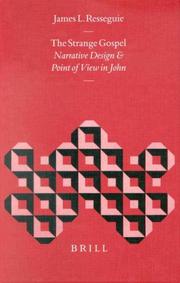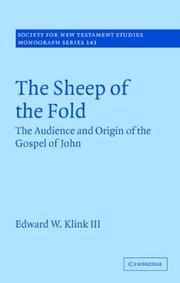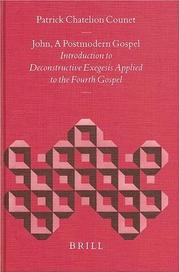| Listing 1 - 10 of 108 | << page >> |
Sort by
|

ISSN: 09280731 ISBN: 9004122060 9789004122062 9789004494763 9004494766 Year: 2001 Volume: 56 Publisher: Leiden; Boston : BRILL
Abstract | Keywords | Export | Availability | Bookmark
 Loading...
Loading...Choose an application
- Reference Manager
- EndNote
- RefWorks (Direct export to RefWorks)
In this literary analysis of the Gospel of John, Resseguie examines rhetoric, setting, character, and plot to uncover the Gospel's unique point of view. He shows the usefulness of the concepts of defamiliarization and point of view for understanding how the narrator makes the familiar seem strange. A material, familiar point of view that is voiced by the dominant culture is compared with a defamiliarized, strange point of view that is expressed by Jesus and the disenfranchised. Through close readings of narrative texts, the author develops and elaborates the theological perspective of John, which emerges in the clash of differing points of view. The introduction defines "objective" and "subjective" point of view, and shows the value of the works of Boris Uspensky and Susan Sniader Lanser for understanding the Gospel of John. In chapter one, irony, misunderstandings, and double entendres are shown to be important rhetorical tools in the Gospel's attempt to make the familiar seem strange. Chapter two discusses point of view as it is expressed in architectural settings (sheepfold, garden, courtyard, praetorium, well, temple, and tomb) and in topographical settings (sea, mountain). Chapter three highlights the distinct points of view of Jesus, Nicodemus, religious authorities, the world, the royal official, the man at the pool, the man born blind, Mary Magdalene, Simon Peter, the beloved disciple, and Judas. Chapter four discusses the point of view that emerges from an analysis of the plot. The final chapter is a summary of the narrative's singular point of view. This work is a suitable introduction to a literary analysis of the Gospel of John. It makes an important contribution to narrative criticism on the Fourth Gospel in particular, and to our understanding of defamiliarization and point of view in general. The book confronts head-on habitualized and familiar ways of thinking in the ancient world and today.
Bible. --- Criticism, interpretation, etc. --- 226.5 --- Evangelie volgens Johannes --- Jean (Book of the New Testament) --- Johanisi (Book of the New Testament) --- Johannesevangelium --- John (Book of the New Testament) --- Yohan pogŭm --- Yohane den (Book of the New Testament) --- Yūḥannā (Book of the New Testament) --- Ioganaĭ (Book of the New Testament) --- Иоганай (Book of the New Testament) --- Exegesis --- John (Book of the Bible)

ISBN: 9780521875820 052187582X 9780511488023 9780521130448 9780511350108 0511350104 0511349246 9780511349249 1107182271 1281086177 9786611086176 1139132962 0511351003 0511488025 0511348274 0521130441 Year: 2007 Volume: 141 Publisher: Cambridge, UK New York Cambridge University Press
Abstract | Keywords | Export | Availability | Bookmark
 Loading...
Loading...Choose an application
- Reference Manager
- EndNote
- RefWorks (Direct export to RefWorks)
The last generation of gospel scholarship has considered the reconstruction and analysis of the audience behind the gospels as paradigmatic. The key hermeneutical template for reading the gospels has been the quest for the community that each gospel represents. This scholarly consensus regarding the audience of the gospels has been reconsidered. Using as a test case one of the most entrenched gospels, Edward Klink explores the evidence for the audience behind the Gospel of John. This study challenges the prevailing gospel paradigm by examining the community construct and its functional potential in early Christianity, the appropriation of a gospel text and J. L. Martyn's two-level reading of John, and the implied reader located within the narrative. The study concludes by proposing a more appropriate audience model for reading John, as well as some implications for the function of the gospel in early Christianity.
Bible. --- Criticism, interpretation, etc. --- 226.5 --- Evangelie volgens Johannes --- Jean (Book of the New Testament) --- Johanisi (Book of the New Testament) --- Johannesevangelium --- John (Book of the New Testament) --- Yohan pogŭm --- Yohane den (Book of the New Testament) --- Yūḥannā (Book of the New Testament) --- Ioganaĭ (Book of the New Testament) --- Иоганай (Book of the New Testament) --- Arts and Humanities --- Religion
Book
ISBN: 9788876531774 8876531777 Year: 2009 Volume: 177 Publisher: Roma Gregorian & biblical press
Abstract | Keywords | Export | Availability | Bookmark
 Loading...
Loading...Choose an application
- Reference Manager
- EndNote
- RefWorks (Direct export to RefWorks)
Love --- Biblical teaching --- Bible --- 226.5 --- Evangelie volgens Johannes --- Bible. --- Jean (Book of the New Testament) --- Johanisi (Book of the New Testament) --- Johannesevangelium --- John (Book of the New Testament) --- Yohan pogŭm --- Yohane den (Book of the New Testament) --- Yūḥannā (Book of the New Testament) --- Ioganaĭ (Book of the New Testament) --- Иоганай (Book of the New Testament) --- Love - Biblical teaching
Book
ISSN: 05705509 ISBN: 9783110441932 3110441934 9783110444223 9783110436303 3110444224 3110436302 Year: 2016 Volume: 48 Publisher: Berlin: DeGruyter,
Abstract | Keywords | Export | Availability | Bookmark
 Loading...
Loading...Choose an application
- Reference Manager
- EndNote
- RefWorks (Direct export to RefWorks)
As a witness to the early Coptic and Greek Biblical traditions, Papyrus Bodmer III is of vital interest to biblical scholars. This updated transcription is unique in providing readers with direct access to the original text by positioning digital images of the actual papyrus side by side with a new transcription of each page. Over 100 corrections to Kasser's 1958 transcription underscore the importance of this book for serious students of the New Testament.A detailed introduction examines the provenance, codex and paleography of P. Bodmer III, presents the singular readings discovered in the text, and separates these readings into meaningful categories. Finally, the appendices provide a complete list of the 1,960 singular readings, a brief description of the 119 corrections made by the original scribe, and a quick reference to the location of all corrections to Kasser's 1958 transcription, as well as corrections to citations in the NA 28th edition.This work will prove a valuable asset to anyone interested in Coptic Biblical studies, New Testament textual criticism, scribal habits, and other related fields.
226.5 --- 222.2 --- 222.2 Genesis --- 222.2 La Genese --- Genesis --- La Genese --- 226.5 Evangelie volgens Johannes --- 226.5 Evangile de S. Jean --- Evangelie volgens Johannes --- Evangile de S. Jean --- Bible. --- Manuscripts (Papyri) --- Criticism, Textual --- Bible --- Bodmer. --- Coptic. --- Genesis. --- Johannesevangelium. --- John. --- koptisch. --- RELIGION / Biblical Criticism & Interpretation / New Testament. --- Criticism, Textual. --- Bible. - Manuscripts (Papyri) - Criticism, Textual
Book
ISBN: 9789004176331 9004176330 128294973X 9786612949739 904742977X 9789047429777 Year: 2010 Volume: 132 Publisher: Leiden [Netherlands] ; Boston : Brill,
Abstract | Keywords | Export | Availability | Bookmark
 Loading...
Loading...Choose an application
- Reference Manager
- EndNote
- RefWorks (Direct export to RefWorks)
This volume investigates the early, second-century reception of the Fourth Gospel. This is an era when its fortunes are surrounded by silence and mystery. It was assumed, until quite recently, that Gnostic and other so-called heterodox groups were the first ones to appreciate this gospel, and hence the mainstream Christians avoided using it until Irenaeus rescued it for the church. Lately, this view has been challenged by several scholars for several reasons. The contributions in this volume, written by leading specialists in their respective fields, offer an approachable, fresh, comprehensive and up-to-date view of the second-century reception of John’s Gospel, in a situation where new understandings about various forms of early Christianity and its multiformity have started to emerge.
Bible --- Criticism, interpretation, etc --- History --- Jean (Book of the New Testament) --- Johanisi (Book of the New Testament) --- Johannesevangelium --- John (Book of the New Testament) --- Yohan pogŭm --- Yohane den (Book of the New Testament) --- Yūḥannā (Book of the New Testament) --- Bible. --- Criticism, interpretation, etc. --- 226.5 --- Evangelie volgens Johannes --- Ioganaĭ (Book of the New Testament) --- Иоганай (Book of the New Testament)
Book
ISBN: 0802818641 Year: 1987 Publisher: Grand Rapids London Eerdmans Marshall, Morgan & Scott
Abstract | Keywords | Export | Availability | Bookmark
 Loading...
Loading...Choose an application
- Reference Manager
- EndNote
- RefWorks (Direct export to RefWorks)
226.5 --- Evangelie volgens Johannes --- Jean (Book of the New Testament) --- Johanisi (Book of the New Testament) --- Johannesevangelium --- John (Book of the New Testament) --- Yohan pogŭm --- Yohane den (Book of the New Testament) --- Yūḥannā (Book of the New Testament) --- Bible. John --- Commentaries --- Bible. --- Commentaries. --- Ioganaĭ (Book of the New Testament) --- Иоганай (Book of the New Testament)
Book
ISBN: 9789042921542 9042921544 Year: 2009 Volume: 223 Publisher: Leuven Peeters
Abstract | Keywords | Export | Availability | Bookmark
 Loading...
Loading...Choose an application
- Reference Manager
- EndNote
- RefWorks (Direct export to RefWorks)
Bible NT. Gospels. John --- Bible --- Criticism, interpretation, etc --- 226.5 --- Academic collection --- Evangelie volgens Johannes --- Conferences - Meetings --- Bible. --- Jean (Book of the New Testament) --- Johanisi (Book of the New Testament) --- Johannesevangelium --- John (Book of the New Testament) --- Yohan pogŭm --- Yohane den (Book of the New Testament) --- Yūḥannā (Book of the New Testament) --- Criticism, interpretation, etc. --- Bible. John --- Congresses --- Ioganaĭ (Book of the New Testament) --- Иоганай (Book of the New Testament)
Book
ISBN: 9782503550138 2503550134 Year: 2014 Volume: 267 Publisher: Turnhout Brepols
Abstract | Keywords | Export | Availability | Bookmark
 Loading...
Loading...Choose an application
- Reference Manager
- EndNote
- RefWorks (Direct export to RefWorks)
John [Evangelist] --- Anselm, --- Bible. --- Early works to 1800. --- 2 ANSELMUS LAUDUNENSIS --- 230.005 --- Godsdienst. Theologie--ANSELMUS LAUDUNENSIS --- Religion Christian theology Serial publications --- Anselmo, --- Anselmus, --- Anselme, --- Jean (Book of the New Testament) --- Johanisi (Book of the New Testament) --- Johannesevangelium --- John (Book of the New Testament) --- Yohan pogŭm --- Yohane den (Book of the New Testament) --- Yūḥannā (Book of the New Testament) --- Commentaries --- 2 ANSELMUS LAUDUNENSIS Godsdienst. Theologie--ANSELMUS LAUDUNENSIS --- Ioganaĭ (Book of the New Testament) --- Иоганай (Book of the New Testament)

ISBN: 9004116613 9004493905 9789004116610 9789004493902 Year: 2000 Volume: 44 Publisher: Leiden Brill
Abstract | Keywords | Export | Availability | Bookmark
 Loading...
Loading...Choose an application
- Reference Manager
- EndNote
- RefWorks (Direct export to RefWorks)
This study deals with the postmodern philosophy of language as developed mainly by French authors as R. Barthes, J. Derrida and J.-F. Lyotard. The four chapters of the first part are theoretical and relate the literary concepts of postmodernity, poststructuralism and deconstruction to the practice of biblical exegesis. One of the important conclusions is that deconstruction affects both diachronic and synchronic approaches of texts. Each chapter closes with -not suggestions but- implications for a postmodern, deconstructive strategy of reading. The four chapters of the second part apply this postmodern, deconstructive strategy of reading to the Fourth Gospel as a whole (chapter five), to John 6 (chapter six), to John 17 (chapter seven) and to John 21, 24-25 (chapter eight). This deconstructive reading shows the differential and apophatic character of Saint John's Gospel.
Bible NT. Gospels. John --- Deconstruction --- Postmodernism --- 226.5 --- Post-modernism --- Postmodernism (Philosophy) --- Arts, Modern --- Avant-garde (Aesthetics) --- Modernism (Art) --- Philosophy, Modern --- Post-postmodernism --- Criticism --- Semiotics and literature --- Evangelie volgens Johannes --- Bible. --- Jean (Book of the New Testament) --- Johanisi (Book of the New Testament) --- Johannesevangelium --- John (Book of the New Testament) --- Yohan pogŭm --- Yohane den (Book of the New Testament) --- Yūḥannā (Book of the New Testament) --- Criticism, interpretation, etc. --- Ioganaĭ (Book of the New Testament) --- Иоганай (Book of the New Testament)
Book
ISBN: 9061861799 9789061861799 Year: 1985 Volume: 11 Publisher: Leuven Universty Press
Abstract | Keywords | Export | Availability | Bookmark
 Loading...
Loading...Choose an application
- Reference Manager
- EndNote
- RefWorks (Direct export to RefWorks)
Bible NT. Gospels. John --- Jean, Saint --- Johannes, Heilige --- Nieuwe Testament --- Nouveau Testament --- Bible --- Language, style --- 226.5 --- Academic collection --- #gsdb1 --- Evangelie volgens Johannes --- Bible. --- Jean (Book of the New Testament) --- Johanisi (Book of the New Testament) --- Johannesevangelium --- John (Book of the New Testament) --- Yohan pogŭm --- Yohane den (Book of the New Testament) --- Yūḥannā (Book of the New Testament) --- Language, style. --- Jean (Saint). Evangile. Style. --- Johannes (Hl.). Evangelie. Stijl. --- Ioganaĭ (Book of the New Testament) --- Иоганай (Book of the New Testament)
| Listing 1 - 10 of 108 | << page >> |
Sort by
|

 Search
Search Feedback
Feedback About UniCat
About UniCat  Help
Help News
News